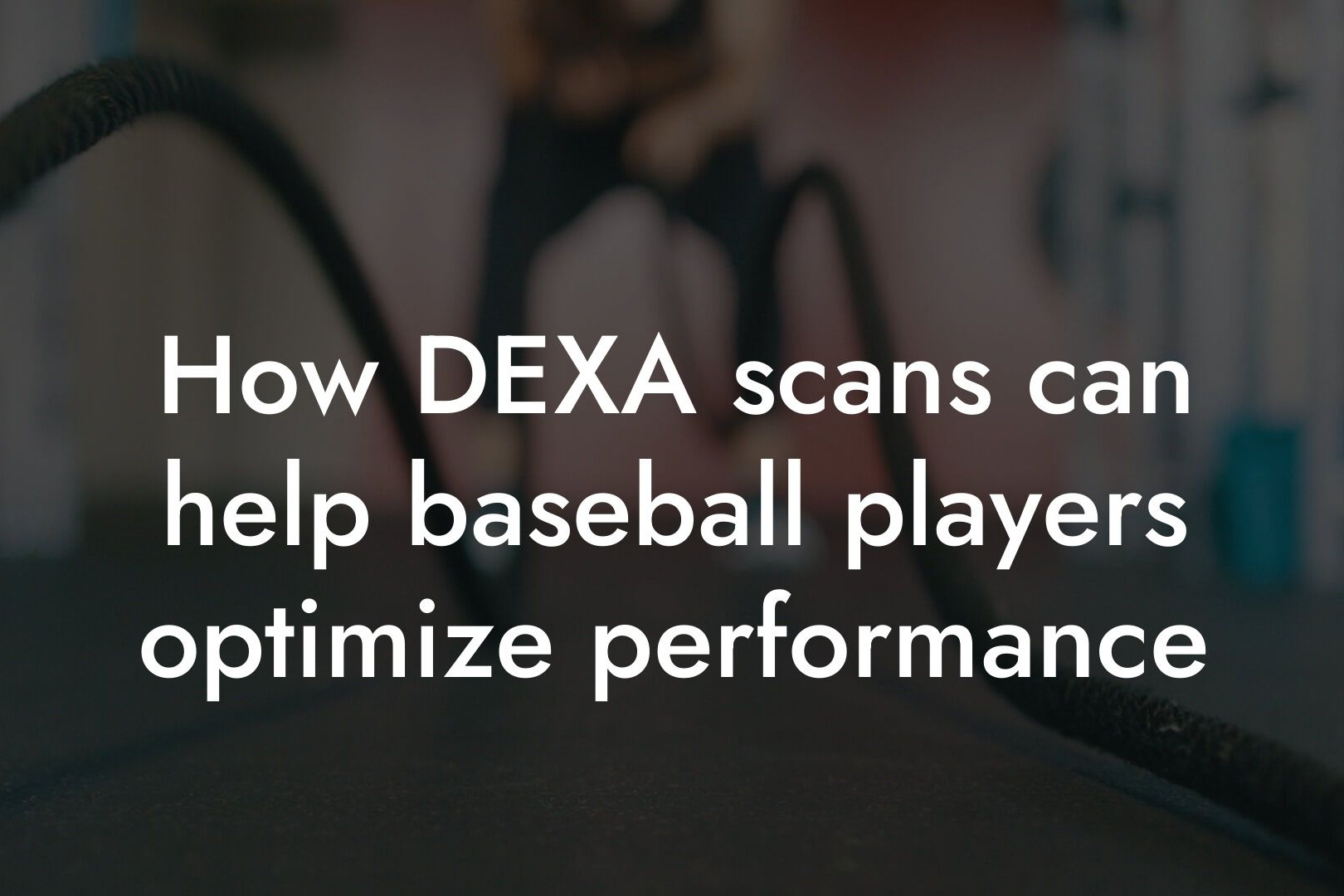As a high-earning professional interested in maintaining a healthy physique, you understand the importance of taking care of your body. One crucial aspect of overall health is bone density, which plays a significant role in injury prevention, particularly in high-impact sports like baseball. In this article, we'll delve into the world of bone density, its impact on injury prevention, and how our DEXA machine can help you optimize your body for peak performance.
Table of Contents
What is Bone Density?
Bone density refers to the measure of how dense and strong your bones are. It's a critical indicator of your overall bone health, and it's essential for athletes, especially those involved in high-impact sports like baseball. Bone density is measured in grams per cubic centimeter (g/cm³), and it's typically assessed using a DEXA (Dual-Energy X-ray Absorptiometry) scan.
Why is Bone Density Important in Baseball?
In baseball, players are constantly exposed to high-impact movements, such as running, jumping, and sliding. These actions can put tremendous stress on the bones, increasing the risk of fractures and other injuries. Strong bones with high density can better withstand these stresses, reducing the likelihood of injury. Additionally, good bone density can improve overall athletic performance, as it allows players to move more efficiently and explosively.
The Risks of Low Bone Density in Baseball
Low bone density can have severe consequences for baseball players. Weakened bones are more prone to fractures, which can lead to extended periods of recovery and even premature retirement from the sport. Furthermore, low bone density can increase the risk of osteoporosis, a condition characterized by brittle and porous bones. Osteoporosis can lead to a range of issues, including vertebral compression fractures, hip fractures, and spinal deformities.
Factors Affecting Bone Density in Baseball Players
Several factors can influence bone density in baseball players, including:
-
Age: Bone density naturally decreases with age, making older players more susceptible to injuries.
-
Genetics: Genetic predisposition can affect bone density, with some individuals being more prone to low bone density.
-
Nutrition: A diet lacking essential nutrients, such as calcium and vitamin D, can negatively impact bone density.
-
Exercise: A lack of weight-bearing exercise can contribute to low bone density.
-
Hormonal Imbalances: Hormonal imbalances, such as low testosterone levels, can affect bone density.
How to Improve Bone Density for Baseball Players
Fortunately, there are several ways to improve bone density for baseball players, including:
-
Resistance Training: Engaging in resistance exercises, such as weightlifting, can help strengthen bones.
-
High-Impact Exercise: Participating in high-impact activities, like jumping and running, can stimulate bone growth.
-
Proper Nutrition: Consuming a balanced diet rich in calcium and vitamin D can support bone health.
-
Adequate Sleep: Getting sufficient sleep is essential for bone health, as it allows the body to repair and rebuild bones.
-
DEXA Scans: Regular DEXA scans can help monitor bone density and identify areas for improvement.
The Role of DEXA Scans in Injury Prevention
DEXA scans play a critical role in injury prevention by providing a comprehensive assessment of bone density. Our DEXA machine uses advanced technology to measure bone density in various parts of the body, including the hips, spine, and legs. With this information, baseball players can:
-
Identify areas of low bone density and take corrective action.
-
Monitor the effectiveness of their training and nutrition programs.
-
Develop personalized training programs to improve bone density and reduce the risk of injury.
Bone density is a critical aspect of overall health, particularly for baseball players. By understanding the importance of bone density, the risks of low bone density, and the factors that affect it, players can take proactive steps to improve their bone health and reduce the risk of injury. At Tano Performance Group, our DEXA machine provides a comprehensive assessment of bone density, empowering players to optimize their bodies for peak performance. Take control of your bone health today and unlock your full potential on the field.
Frequently Asked Questions
What is bone density and why is it important for baseball players?
Bone density refers to the measure of how dense and strong your bones are. It's essential for baseball players because it directly affects their risk of injury, particularly fractures and stress fractures. Stronger bones can withstand the physical demands of the game, reducing the likelihood of injuries that can keep players sidelined.
How does bone density impact injury prevention in baseball?
Bone density plays a crucial role in injury prevention in baseball. When bones are strong and dense, they can absorb the impact of falls, collisions, and repetitive movements, reducing the risk of fractures and stress fractures. Additionally, good bone density helps to distribute the forces of movement more evenly, reducing the stress on joints and muscles, which can also lead to injuries.
What are the risks of low bone density for baseball players?
Low bone density can lead to an increased risk of fractures, stress fractures, and other injuries that can keep baseball players out of the game. This can result in lost playing time, decreased performance, and even long-term damage to their athletic career. Furthermore, low bone density can also increase the risk of osteoporosis and other bone-related health issues later in life.
How can baseball players improve their bone density?
Baseball players can improve their bone density through a combination of proper nutrition, exercise, and lifestyle habits. This includes consuming a diet rich in calcium and vitamin D, engaging in weight-bearing exercises such as strength training and plyometrics, and getting adequate sleep and recovery time. Additionally, reducing the risk of injuries through proper training and technique can also help to protect bone density.
What role does nutrition play in bone density for baseball players?
Nutrition plays a critical role in bone density for baseball players. A diet rich in calcium, vitamin D, and other essential nutrients is necessary for building and maintaining strong bones. Foods such as dairy products, leafy greens, and fortified cereals can help to support bone health. Additionally, adequate hydration and electrolyte balance are also important for maintaining healthy bones.
How does exercise impact bone density in baseball players?
Exercise has a significant impact on bone density in baseball players. Weight-bearing exercises such as strength training and plyometrics can help to stimulate bone growth and density. Additionally, exercises that focus on functional movements, such as squats and lunges, can help to improve bone density in the hips, legs, and spine. High-impact exercises, such as jumping and running, can also help to improve bone density in the legs and hips.
What is the relationship between bone density and body composition for baseball players?
Bone density and body composition are closely linked for baseball players. Maintaining a healthy body composition, including a low body fat percentage, can help to support bone density. Excess body fat can lead to increased inflammation and oxidative stress, which can negatively impact bone health. Additionally, having a high percentage of lean muscle mass can help to support bone density by providing additional strength and stability.
How can baseball players monitor their bone density?
Baseball players can monitor their bone density through a variety of methods, including dual-energy X-ray absorptiometry (DXA) scans, quantitative computed tomography (QCT) scans, and peripheral quantitative computed tomography (pQCT) scans. These tests can provide valuable information about bone density and help to identify any potential issues early on.
What are the most common injuries related to low bone density in baseball?
The most common injuries related to low bone density in baseball include stress fractures, particularly in the legs, hips, and spine. Other common injuries include fractures, shin splints, and tendonitis. These injuries can be debilitating and require significant time off from playing, which can impact a player's performance and overall career.
How can baseball players reduce their risk of stress fractures?
Baseball players can reduce their risk of stress fractures by taking steps to improve their bone density, including consuming a diet rich in calcium and vitamin D, engaging in weight-bearing exercises, and getting adequate sleep and recovery time. Additionally, players can reduce their risk of stress fractures by gradually increasing their training intensity and volume, wearing proper footwear, and using proper technique when playing.
What is the impact of age on bone density in baseball players?
Age can have a significant impact on bone density in baseball players. As players age, their bone density naturally decreases, which can increase their risk of injury. However, this decline can be slowed or even reversed with proper nutrition, exercise, and lifestyle habits. Additionally, older players may need to modify their training and playing habits to accommodate any age-related declines in bone density.
How does bone density impact performance in baseball?
Bone density can have a significant impact on performance in baseball. Stronger bones can help to improve power, speed, and agility, as well as reduce the risk of injury. When players have good bone density, they can perform at a higher level and maintain their performance over time. Conversely, low bone density can lead to decreased performance and increased risk of injury.
Can bone density be improved at any age?
Yes, bone density can be improved at any age. While peak bone density is typically reached in early adulthood, it's never too late to take steps to improve bone density. With proper nutrition, exercise, and lifestyle habits, baseball players of any age can improve their bone density and reduce their risk of injury.
How does bone density impact longevity in baseball?
Bone density can have a significant impact on longevity in baseball. Players with good bone density are more likely to have a longer and healthier career, as they are less likely to experience injuries that can keep them sidelined. Additionally, good bone density can help to reduce the risk of long-term health issues, such as osteoporosis and osteoarthritis, which can impact a player's quality of life after retirement.
What role does genetics play in bone density for baseball players?
Genetics can play a role in bone density for baseball players, as some individuals may be more prone to low bone density due to their genetic makeup. However, genetics is only one factor, and proper nutrition, exercise, and lifestyle habits can still help to improve bone density and reduce the risk of injury.
How can baseball players balance the demands of training and competition with bone density maintenance?
Baseball players can balance the demands of training and competition with bone density maintenance by prioritizing proper nutrition, exercise, and recovery habits. This includes consuming a diet rich in calcium and vitamin D, engaging in weight-bearing exercises, and getting adequate sleep and recovery time. Additionally, players can modify their training and playing habits to reduce the risk of injury and prioritize bone health.
What are some common myths about bone density and baseball?
One common myth is that bone density is only important for older players. However, bone density is important for players of all ages, as it can impact performance and injury risk. Another myth is that bone density is solely determined by genetics, when in fact, it can be improved through proper nutrition, exercise, and lifestyle habits.
How can baseball players get started with improving their bone density?
Baseball players can get started with improving their bone density by consulting with a healthcare professional or registered dietitian to develop a personalized plan. This may include modifying their diet to include more calcium-rich foods, incorporating weight-bearing exercises into their training routine, and prioritizing adequate sleep and recovery time. Additionally, players can educate themselves on bone density and its impact on performance and injury risk.
What are some additional resources for baseball players looking to improve their bone density?
Additional resources for baseball players looking to improve their bone density include consulting with a sports dietitian or strength coach, reading reputable sources on bone health and nutrition, and seeking out educational resources from organizations such as the National Osteoporosis Foundation. Players can also consider working with a healthcare professional to develop a personalized plan for improving their bone density.
Here are some related articles you might love...
- How DEXA scans can help baseball players optimize performance
- Recovery strategies for baseball athletes
- Off-season conditioning for baseball players
- Strength training programs for baseball athletes
- Reducing body fat for better speed on the bases
- Balancing muscle mass and flexibility in baseball
- The importance of core strength in baseball performance
- The role of body composition in baseball power and endurance
- Nutrition strategies for maintaining muscle during the baseball season
Zak Faulkner
Zak Faulkner is a leading authority in the realm of physical health and body composition analysis, with over 15 years of experience helping professionals optimise their fitness and well-being. As one the experts behind Tano Performance Group, Zak has dedicated his career to providing in-depth, science-backed insights that empower clients to elevate their physical performance and overall health.
With extensive knowledge of DEXA technology, Zak specializes in delivering comprehensive body assessments that offer precise data on body fat, muscle mass, bone density, and overall physique. His expertise enables individuals to make informed decisions and achieve their fitness goals with accuracy and confidence. Zak’s approach is rooted in a deep understanding of human physiology, combined with a passion for helping clients unlock their full potential through personalised strategies.
Over the years, Zak has earned a reputation for his commitment to excellence, precision, and client-focused service. His guidance is trusted by top professionals who demand the best when it comes to their health. Whether advising on fitness programs, nutritional strategies, or long-term wellness plans, Zak Faulkner’s insights are a valuable resource for anyone serious about taking their health and fitness to the next level.
At Tano Performance Group, Zak continues to lead our Content Team revolutionising how professionals approach their physical health, offering unparalleled expertise that drives real results.




